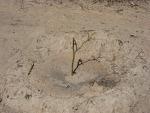Lockdown is a challenge. But, for me it also allows space for some conversations that might usually get squeezed between meetings and then forgotten.
Yesterday I had two. Both ran around how the current situation impacts us now and might do in the future. My question (or one of them, at least) is this: when life and its routines are disrupted or taken away, which wells do we draw from to sustain life and meaning? While everything changes above the surface and the shape of the future is uncertain, can we locate the underground streams that keep flowing anyway?
There is probably a better way of putting this. But, in a really stimulating conversation with a BBC friend yesterday morning we were wondering if this crisis has revealed the shallowness of many of our cultural or personal wells. It’s a question, not a statement.
For me, as a Christian, the wells – the underground streams – go back a very long way. The creation narratives in Genesis speak of order being brought out of chaos. The Exodus has a people’s settled world being ruptured and them being driven out of the familiar into the strangeness of a desert where they had to lose before they could gain – to lament the loss of a world before being in a position to reorientate towards a different future in a different place. (It took forty years.) Later the people get exiled from the land of promise (twice, in fact – in the eighth and sixth centuries BC) and take time to live with their loss … before settling in the strange land … and then, generations later, having to leave again. They return ‘home’, but discover that home is no longer what they remembered.
I could go on. The Christian tradition lives and feeds from these narratives of leaving and moving and settling only to be disrupted and moved again. And this experience is rooted in an acceptance of mortality and contingency and what goes with the freedom of living in a material world.
But, we don’t usually transition straight from one world to another. We have to stay with the loss, lamenting what has been lost, grieving for a world (or way of life) now gone. People will take a shorter or longer time to live with this. There will be anger, powerlessness and disorientation. And while this is going on some people will accept the new reality and start orientating towards creating a new world.
So, what are the narratives or assumptions that keep us nourished while all this goes on around and above us?
Christian faith does not assume a life (or world)of continuous security and familiarity. It is fed by scriptures that speak of transience, mortality, provisionality, interruption and leavings. But, they also whisper that the endings are always beginnings – the leavings open a door to arrivals that could not have been experienced otherwise. In other words, the loss can be seen as a gift – what Walter Brueggemann calls ‘newness after loss’.
So, as I have suggested to clergy in the Diocese of Leeds, we might be helped in articulating this by asking four questions: (a) what have I/we lost that we need to regain in the weeks and months ahead? (b) what have we lost that needs to remain lost – left behind in another country? (c) what have I/we gained that we need to retain in the future? (d) what have we gained recently that was useful for this season but needs to be lost if we are to move forward?
We might feel sometimes that we don’t have much to go on. The photo below is one I took on a visit to a farm in Gweru, Zimbabwe, back in 2007. During a drought and amid economic collapse, someone had planted a rose in arid ground and watered it each day. It was a prophetic challenge to the desert; it was an act of hope, of prophetic imagination. Today is not the end.

